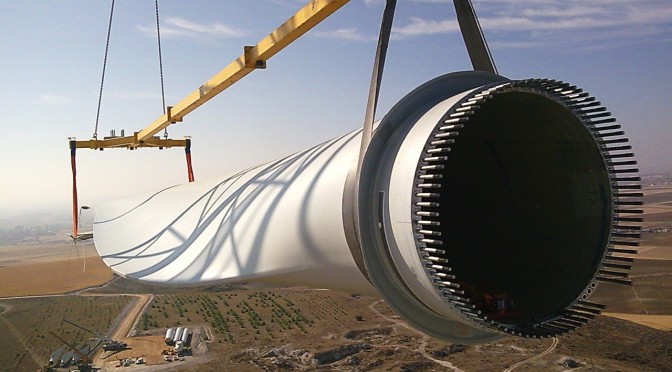EDP Renewables (Euronext: EDPR), a global leader in the renewable energy sector and one of the world’s largest wind energy producers, today announced a cooperation agreement with Thermal Recycling of Composites (TRC), a spin-off of the Spanish Council for Scientific Research (Consejo Superior de Investigaciones Científicas, CSIC), for the implementation of a wind turbine blade recycling programme and the launch of the new R3FIBER system. The signing was attended by João Manso Neto, CEO of EDPR, Oriol Grau, CEO of TRC, and Javier Etxabe, who represented CSIC’s Vicepresidency for Knowledge Transfer as head of the Results Protection and Promotion of Technology-Based Companies Unit.
This pilot initiative will apply to faulty or damaged wind turbine blades that need to be replaced, and, in the future, blades from EDPR wind farms that have reached the end of their life cycle. The management of wind energy waste is a growing concern. This waste does not yet stand at significant volumes as the wind energy business has only been developed recently. To address the situation of managing this non-hazardous waste going forward, EDPR has partnered with TRC to create a new, sustainable system that allows wind turbine blades to be put to use.
R3FIBER technology was developed by TRC and a team at CSIC’s National Center for Metallurgical Research led by Félix López Gomez. The technology is based on fully using materials without producing waste, through a process of thermochemical transformation that converts the resins of combustible gases and liquid fuels into glass or carbon fibers that can then be reused. If the blades contain carbon fibers, there are no limitations on the use of composites or on the management of material, since the technology is applicable to components made from both fiberglass and carbon fiber.
R3FIBER technology fully harnesses mass, energy and the reuse of materials. It is the only technology that creates high-quality fibers (without resins) that are suitable for reuse. It is sustainable, because it does not generate waste, and efficient because it allows for maximum energy recovery.
EDP Renováveis has signed an agreement with TRC to develop viable, maximum-efficiency alternatives for recycling wind turbine blades that are no longer in use.
Spain is ranked fourth in the world for installed wind power capacity, behind China, the United States and Germany. Of all Spanish wind farms, 60% are more than 15 years old, and some of them will reach the end of their life cycle in the coming years. This pioneering project, undertaken by EDPR and TRC, could solve the problem of dealing with this waste, reducing the environmental impact of wind energy.
Wind turbines are made of recyclable material, mainly metals. Therefore, the main challenge currently lies in the blades, which are composed of complex materials. The role of companies such as EDPR is essential for the transition toward a sustainable economy, and particularly in supporting solutions that address the challenge of recycling wind turbine blades at the end of their lifespan.
EDP Renewables (Euronext: EDPR) is a global leader in the renewable energy sector and the world’s fourth-largest wind energy producer. With a sound development pipeline, first class assets and market-leading operating capacity, EDPR has undergone exceptional development in recent years and is currently present in 12 markets (Belgium, Brazil, Canada, France, Italy, Mexico, Poland, Portugal, Romania, Spain, the UK and the US). Energias de Portugal, S.A. (“EDP”), the principal shareholder of EDPR, is a global energy company and a leader in value creation, innovation and sustainability. EDP has been a Dow Jones Sustainability Index for eight consecutive years.
CSIC is the largest public research institution in Spain and the third largest in Europe. Its fundamental objective is the development and promotion of research that benefits scientific and technological progress, and to underpin cooperation between Spanish and foreign organisations. Its mission is to promote, coordinate, develop and spread scientific and technological research in a multidisciplinary manner, with the aim of contributing to knowledge advancement, economic, social and cultural development, as well as to the training of the workforce and consulting public and private organisations in this area. CSIC plays a central role in scientific and technological policy making, as it handles everything from basic investigation to knowledge transfer for the industrial sector. The organisation’s research is driven by its centres and institutes, distributed across every Spanish autonomous region. These centres employ over 15,000 people, including more than 3,000 staff researchers and many doctors and scientists in training. CSIC has 6% of its staff dedicated to research and development in Spain, which makes up about 20% of the country’s scientific output.


